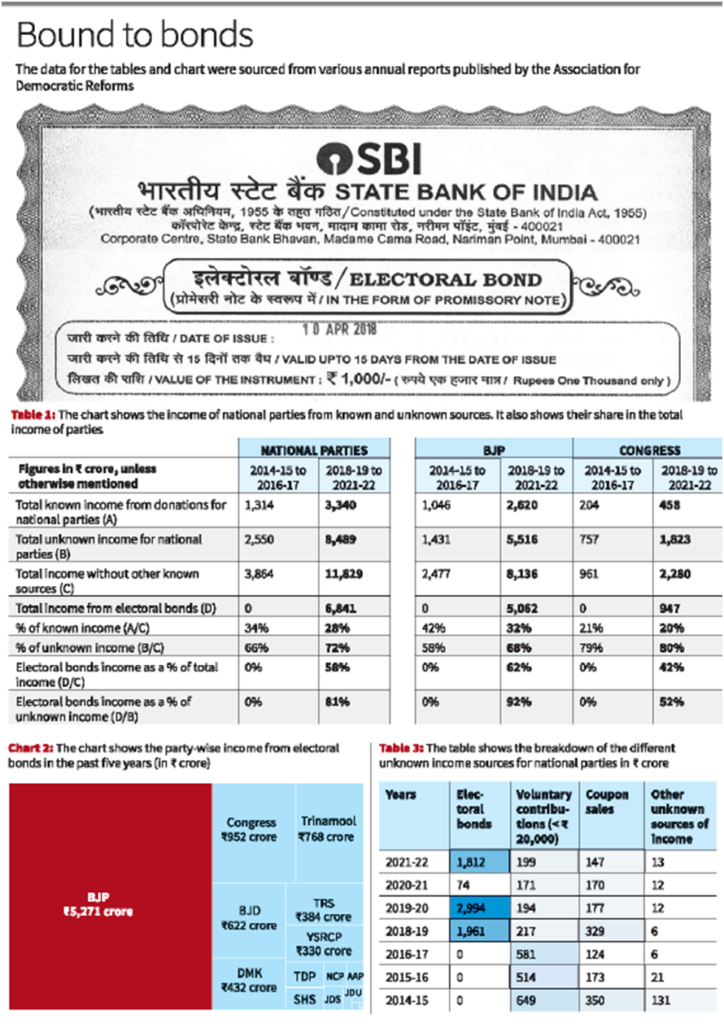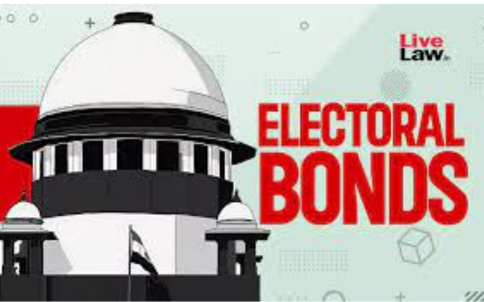Question is why there is no right to information on contributions received by political parties through the electoral bonds scheme. Why this anonymity of the ‘bonds’? Why this “selective anonymity” because the State Bank of India, which has been authorised to issue and en cash electoral bonds, comes within the purview of the Union government. The senior advocate Prashant Bhushan characterised as one that “goes to the very root of our democracy”
The Supreme Court has rightly asked for this data in two weeks on 2 November 2023. The SC directed SBto provided updated data till September 2023. However, a five-judge Bench led by Chief Justice of India D.Y. Chandrachud along with the citizens wait on Electoral Bonds.
This scheme was the challenge. The citizen has right to know the ultimate purpose of devising a scheme to sanitise the process of political donations to reduce the infusion of unaccounted-for cash elements in electoral system, the need to encourage use of authorised banking channels, and bring in transparency.
The Chief Justice Chandrachud said:
“You can design another system which does not have the flaws of this system [electoral bonds scheme]… This should not become a legitimisation of kickbacks and quid pro quo between power centres and the people who are benefactors of that power… The purpose of businesses is to carry out business, not to donate to political parties”.
Very serious objection came from the Solicitor-General Tushar Mehta who observed that the electoral bonds scheme has only helped in the inflow of black money to fund political parties from anonymous sources.
The critics are pessimistic of the scheme. How to believe by an assurance or a clear direction of the Supreme Court? People are not ready to believe the mere assurances of AG or SG or statement by the Ministers even in Parliament or Assemblies by State Ministers.
He says: “Digitised payments have increased. We will eradicate black money. Do not be so pessimistic, and explained that the scheme may not live up to the utopian expectations of the petitioners, but it has, over the years, been successful in disincentivising purely cash-based political donations. He said: “Purity of the election process is supreme over the right to vote. Voters’ ballot choices are not based on which party gets funds from whom, but on the ideology, leadership, and efficiency of the party.”
Chief Justice Chandrachud addressed advocate Prashant Bhushan’s objections on behalf of the petitioners: “Earlier regime was purely cash-based. According to you, they have proceeded with the anonymity aspect. But there is one change, electoral bonds have brought whatever is contributed in the form of accounted transactions within normal banking channels”.
An editorial article VIGNESH RADHAKRISHNAN, REBECCA ROSE VARGHESE and JASMIN NIHALANI dated 2.11.2023 gives a data of tables, though not as per the direction of Supreme Court, which is going to get in coming two weeks. It is the share of income from unknown sources to national parties was lower at 66% in the two years before the scheme compared to the 72% afterwards.
The ADR categorises the income of political parties into two primary categories: known and unknown. Known income is further divided into two subtypes — voluntary contributions over Rs. 20,000 with donor details provided to the ECI, and other known sources of income such as the sale of movable and immovable assets.
On the other hand, unknown income encompasses voluntary donations under Rs. 20,000, money obtained through electoral bonds, sales of coupons, and similar means where donor details remain undisclosed to the public.
Some more details are available from the Hindu newspaper dated 2 November 2023.
(Based on arguments and reports of media collected by M Sridhar Acharyulu)

(Courtesy of the Hindu daily dated 2.11.2023)
Based on reports given through the Association of Democratic Reforms’ (ADR), their petition before Supreme Court, and other arguments by the Solicitor-General Tushar Mehtasaid the petitioners, represented by senior advocate Kapil Sibal, were unduly “pessimistic” about the scheme, and said that the government is doing everything in its powers to eradicate black money. Attorney-General of India R. Venkataramani has backed the government’s electoral bonds scheme in the Supreme Court, extolling it as a measure which promotes contribution of “clean money” to political parties. He said the scheme ensured that “tax obligations” were met.
Data published by ADR, explained in their annual reports show that the share of “unknown sources of income” has only increased after the introduction of the electoral bonds, the opposite of what the scheme was intended for.
Both petitioners and the Government lawyers say “Besides, the Attorney-General argued that citizens could not have a “general right to know anything and everything without being subjected to reasonable restrictions [Article 19(2)]”. The question is in response to petitioners who claim the electoral bonds scheme legalises the anonymous flow of funds to party coffers. Petitioners have argued that there is a complete blackout of the identities of donors, Indian or foreign, and the individual amounts they have donated to political parties. They said the scheme promoted corruption, favouritism, and even criminalisation of politics in a democracy.
Also read: Secrecy shrouding electoral bonds




